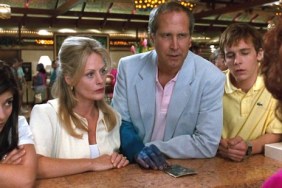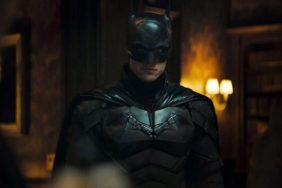When I went to the Cannes Film Festival last year, Donnie Yen was in France at the Cannes Market drumming up business for his upcoming film Iceman. Now Iceman is being released in the States by Well-Go on September 19, but the film had not been completed yet at the time Yen made appearances for foreign distributors. I got to sit down with Yen, with whom I’d spoken many times by phone, but the international festival and market finally brought us together in person. Yen plays a Ming Dynasty warrior frozen in ice and thawed out in modern day Hong Kong. International releases of the movie were in 3D, but the film had not even been produced yet at the time we spoke.
Related: Watch Donnie Yen in the Exclusive Trailer for ’14 Blades’
CraveOnline: How were you able to push your choreography further than before in Iceman?
Donnie Yen: I wouldn’t say further than before, but different from before because first of all, every film should be different. Simply different story lines, but also I look for differences in every one of my films. Iceman is a combination of choreography and 3D and the story background. It should bring something fresh to the audience. I know it will bring something fresh in films that I’ve done before. I’ve never done a film where you can travel through time and in 3D.
Does it slow you down at all to wait for 3D and visual effects?
In the beginning. This is not the first time I’ve done green screen effects. Actually, I did a movie called Monkey King and it’s much more demanding, because every shot was in green screen. So I was educated into being patient shooting green screen. This one is fine.
We haven’t seen Monkey King yet. Is that like Avatar where the entire world is created digitally?
Entire world is green screen, so that was very difficult for me because in the beginning, it was really hard to act when you’re acting with nothing. With that type of experience I had, I spent four months shooting Monkey King and now Iceman. In Iceman, only certain shots were green screen. The majority of the sets were either built or real.
For Monkey King, can you do anything you want in a fight scene, and the computers can put that anywhere?
No, we tried to choreograph like any type of [film], at least my flavor anyway. I always try to do my action as real as possible, whether they are in a more realistic story background, cop/criminal/gangster movies to Iceman. I try to inject real martial arts into film, so even with Monkey King, of course the world of Monkey King is mythological. At the same time, when you actually make contact in scenes with physical combat, I try to make sure the person is really making contact, not just flying around and doing nothing.
I remember seeing a Yuen Biao movie called The Iceman Cometh. Is your Iceman a remake of that?
The original concept, the idea is a remake but the storyline is completely different. I think the filmmaker is trying to capitalize on it but at the end of the day, they realized they don’t really need to. The film was made 20 years ago and most of the young audience today don’t remember that film. So they decided to create something completely new and fresh.
You’ve been doing mostly historical movies since SPL and Flash Point. Is Iceman a way to blend the historical with the modern day?
No, actually last year I did a movie called Special ID. I have three movies launched at this festival: Iceman, Special ID and Last of the Best [now Kung Fu Jungle]. Special ID are the same category as SPL and Flash Point. Cop [movies] blending a lot of MMA action choreography in the film. Last of the Best is with Teddy Chan, another friend of mine. So this year I have a lot of films.
Are you feeling competition from the Thai and Indonesian film industry?
I wouldn’t say competition, but I think if anything I feel motivated because I feel that the market is growing. So therefore, everyone is making action/martial arts films. I do think that Hong Kong or Chinese action film makers now I call it, are still very influential to other countries. Very clearly American films have been influenced heavily by Chinese martial arts films. Korean, Japanese, a lot of my assistant and students that have been with me for many years, some of them were Japanese. They went back to Japan and really created a whole following and injected a lot of vision into their industry. So I do feel honor, as you mentioned the Indonesian and Thai [films], I like to think of them as a good influence, and now it’s motivating me to be even more creative. You’ve got to have good sportsmanship. You’ve got to have competition. I call it healthy competition.
That’s what I’m talking about. What do you see in The Raid or Ong Bak that makes you think, “Wow, I’ve got to top that?”
It gives me a lot of good feelings. Everyone is stepping up so therefore I’ve got to do something more fresh, more new. There’s many ways of being more innovative and more new. It doesn’t mean if you can jump off a two story building, let me jump off three stories. Filmmaking, especially martial arts filmmaking today, there’s just too many elements required in order to make better martial arts movies. I try to be a little more sophisticated because the audience itself is a lot more sophisticated than 30, 40 years ago.
Their martial arts looks so different, and you’ve incorporated different styles like MMA yourself. Do you see anything in Silat or Muay Thai that you feel you can incorporate in your own?
Absolutely, that’s why there’s MMA. MMA itself is incorporated from a lot of different martial arts styles. As a martial artist, I enjoy researching different martial arts styles and I practice many different martial arts styles. For me, there’s a great enjoyment for me to see other martial arts styles. Don’t forget that it’s not the style. It’s the person who performs the style who brings out a different flavor. A Thai actor, if they’re doing Thai boxing, they’re so different from maybe a Chinese actor doing Thai boxing or a western actor doing Thai boxing. I think it’s the person or the actor that are making differences.
What I’m getting at is will we see you use your knees and elbows more?
Yes. Let me watch their films first and I’ll be the judge of that, and I’ll try to do something different too to compensate for that.
Have you seen The Grandmaster?
Of course I’ve seen the trailer but I have not seen the movie.
Did you get any read from the trailer on how different a take on Ip Man The Grandmaster will be than your Ip Man films?
I think it’s very different. I think it’s very Wong Kar Wai. His world, the way he sees things, like any other influential filmmaker he put a lot of his own identity into the film. Unfortunately I haven’t seen the film yet.
I know we’re waiting to see if you make a third Ip Man, but they did a prequel, Ip Man: The Legend Begins. Did they need your permission?
Unfortunately, we don’t have that kind of copyright. If Robert Downey, Jr. has the rights to Iron Man, I don’t have those rights [to Ip Man]. What’s a blessing is I think the audience does recognize who they like to see. I think the success of Ip Man 1 and 2, these two films I have to say are probably among my most influential films. I think the audience would like to see me continue and reprise that role, but not anytime soon for me. I want to wait a few more years. When the time is right and I feel I have a certain type of stimulation to continue to play that role and bring something new to the audience, then I’ll decide to do it again.
Fred Topel is a staff writer at CraveOnline and the man behind Best Episode Ever and The Shelf Space Awards. Follow him on Twitter at @FredTopel.









